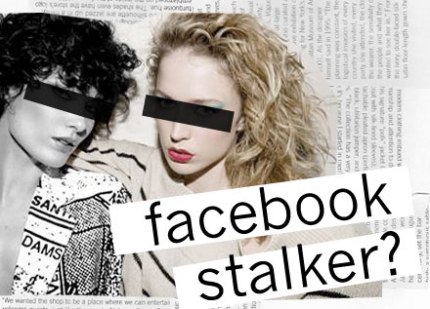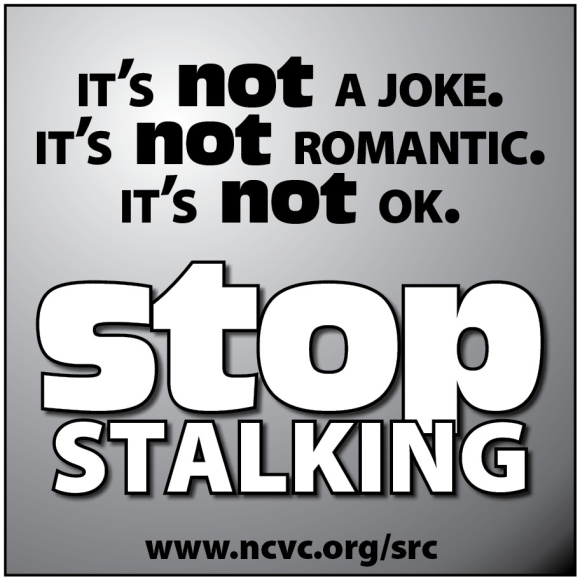Blog Archives
Drawing the line: Stop Stalking on college campuses
Posted by kickinitwithkenna
Hey everyone,
So today I wanted to talk about an issue that I know is commonly overlooked on college campuses. STALKING. While most of you feel that stalking is out of a lifetime movie and does not occur on college campuses, today I’ll be discussing the real side of stalking which is terrifying and unfortunate.
Stalking is a type of abuse that many men and women joke about especially with the creation of Facebook. I know many individuals that say they “stalk” their exes and their new flings or relationships on Facebook, tracking down old girlfriends/boyfriends and start tearing them apart to make themselves feel better. While I am not claiming that this act is stalking I will say that we as a culture should really look at what we call stalking and how we view our technology use. The “creeping” we all do on Facebook with each other is now second nature because social media gives us the idea to share our personal lives while providing the means for others to watch and not be seen. The problem with this is that while most of us using these social networking sites only use this kind of approach sparingly and without intending to do harm, there are people who think opposite.
I would love to think the world is full of only sunshine and rainbows but there is an unfortunate downside to our culture as it is still a rape culture. In our society we have made it seem acceptable to deem a partner as property. The partner who is more prevalent in the case of stalking, relationship abuse, and sexual assault is the woman as she is often demeaned and seen as the submissive in our society. In this kind of domination there are certain individuals who then act on this premise that they own an individual, despite the fact that no human being is owned, and begin to stalk individuals. Being a community where people are constantly in and out of relationships and the internet being as intrusive as it is with peoples’ lives, the presence of stalking is not one that should be overlooked.
The upsetting fact is that “One in 6 women (16.2%) and 1 in 19 men (5.2%) in the United States have experienced stalking victimization at some point during their lifetime in which they felt very fearful or believed that they or someone close to them would be harmed or killed.” which the New Hampshire Coalition Against Domestic and Sexual Violence reported from the The National Intimate Partner and Sexual Violence Survey (NISVS), 2010.
I was personally shocked by the number of people reported in this study who would experience stalking as I bet many of you are which is why we should be spreading the word not discrediting the act as something that will never happen. Stalking is non-discriminating meaning that it can happen regardless of age, race, gender, sexual orientation, ethnic or economic background. Essentially meaning that we are all at risk for stalking as it can be by an acquaintance, someone you have been intimate with or someone you are dating as statistics state that 77 % of female victims and 67% of male victims claim they knew their stalker. The NHCADSV also reported that out of these stalking cases 87% of stalkers are male and 78% of victims are female which follows the idea of the power dynamic I was discussing previously. There are cases of female stalkers and male victims which I will not discredit as they are just as disheartening and upsetting. However, I focus on the male stalker and female victims because statistics show a strong concentration of male stalkers and female victims which can be accredited to our rape culture environment.
It is important to know that individuals stalk as a way to gain control of an individual, to monitor them and try to establish a connection with them that they either cannot have or never will have. So as a community, I believe we should all be more attuned to our safety on campus and really look at the people around us. I’m not saying that everyone on campus is a stalker but after hearing the statistics above and realizing how many people will be affected I think it’s important for people to stop responding with denial when it comes to this behavior. Stalking can, has, and will happen on college campuses and in the world in general not just in movies and it is a horrific experience that no one should have to go through.
For those of you who are unsure about the acts related to stalking the New Hampshire Coalition Against Domestic and Sexual Violence provides the definition of the acts of conduct on their website stating that stalking consists of the following:
- Threatening safety. Following, approaching, or confronting the targeted person.
- Appearing with no legitimate purpose at or around a place where a person can be found, including a residence, workplace, or school.
- Causing damage to property
- Placing an object on the person’s property, either directly or through a third person
- Causing an injury to a family pet
- Acts of communication that are harassing to the individual e.g. letters, packages, electronic transmissions, etc. Engaging in acts which would constitute stalking after having been advised by a law enforcement officer that the person’s acts were in violation of the stalking statute.
If an individual is performing any of these acts against you it is stalking. If you are being stalked you are not at fault and you should not accept the behavior and ignore it but reach out and seek help. Stalking is dangerous and can escalate depending on the situation so I think we should all be knowledgeable of these facts. As much as we as a community say it’ll never happen to us, it will not reduce the chances of stalking cases. Anyone can be the target of a stalker, and those who are being stalked need to know that it is acceptable to reach out for help.
There are safety plans on both the SHARPP website and the NHCADSV website which I will post below. Also SHARPP advocates are trained to help students and faculty through the process of gaining protective orders and handling emergency situations regarding stalking making them an important resource for this issue. Also January is National Stalking Awareness Month so stay tuned for more information in a month or so!
So remember to put yourself first and realize how important your safety is and know that there are some individuals who mean more than a joke and are dangerous and do not forget that there are people who are eager to help.
http://www.nhcadsv.org/whatis_stalking.cfm
New Hampshire Coalition Against Domestic and Sexual Violence
http://unh.edu/sharpp/stalking
SHARPP
All of the statistics used in this blog were from the NHCADSV, link posted above. Images were gathered from goggle images.

